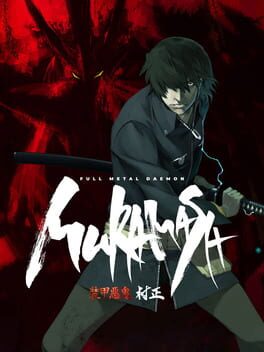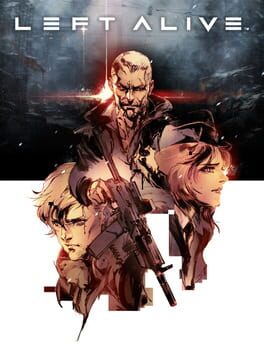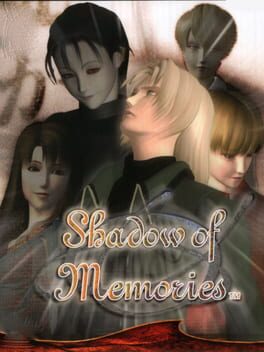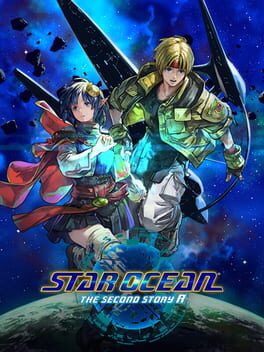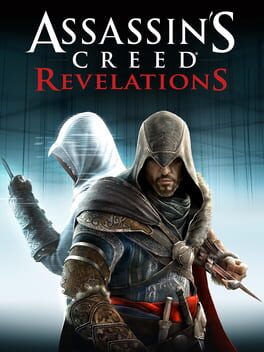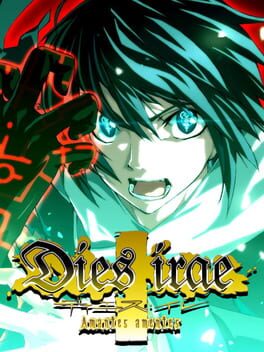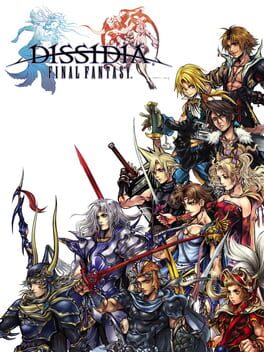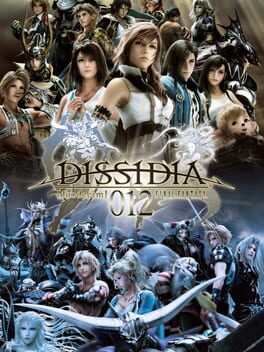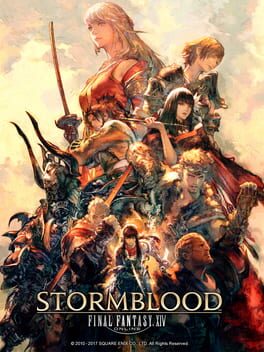Yxshii
57 reviews liked by Yxshii
Kanye Quest 3030
2013
Baldur's Gate 3
2020
Objectively better than BotW, but since it's more iterative than it is groundbreaking, it doesn't have the same impact as its predecessor. Appreciate the saved blueprint options if you don't want to engage with building; those systems can get a little tiring. Still a masterclass in open world games.
Left Alive
2019
TL;DR: you could build a mountain out of the complaints thrown at this game, but you'd only get a molehill out of the ones that are actually valid
left alive isn't metal gear. it has a fair amount of low budget jank, but outside of the inconsistent performance, some weird animations and a few ai quirks here and there, it works as intended (if you can handle literally anything made by cavia, you'll be fine.) that said - depending on your playstyle and willingness to experiment, the experience is either gonna be totally exhilarating or completely exhausting
let's dispel the myth once and for all: not only is left alive not metal gear - it's not even a stealth game. enemies are armed to the teeth. these aren't dudes in military garb - they're soldiers with armored exosuits. it'd be stupid if you could just 'stealth takedown' them. so what's the solution, especially on higher difficulties? (read: any one that isn't the casual mode that they patched in for people who refused to play the game properly)
RUN LIKE A BITCH
oh, but if only i could easily obtain tools to distract or disarm guards to avoid the constant gunfire. if only i could plant traps or obscure my trail with smoke bombs. if only i could slide tackle into enemies while sprinting as if this were vanquish and knock them on their asses. oh wait - i can do all of that. soldiers are spongy, but the sheer amount of ways you can manipulate them justifies that. sure, it'll take eight headshots to kill someone, but what about when while they're too busy shaking off a molotov cocktail to retaliate? or trying to dismantle a barb wire trap?
on paper it might seem like you've got all the tools you need to dispose of anything, but ammo is fairly scarce and you can't carry much of it. maps are visited under different circumstances by all three characters and the loot in each area is finite. stocking up on ammo or all the scrap you can find might sound like a good idea at first, but you could be giving your other characters a much harder time for lack of preparation
narratively, i don't have a lot to say without spoilers. as a front mission fan, it's certainly cool to dicaprio_point.gif at all the familiar terminology and factions. definitely feels like there could've been more on the narrative front, but what's here is cool and the cast carrying things is surprisingly high profile - even nigh animation-less sidequest npcs are absurdly well voiced. the morality decisions are also interesting and fairly pivotal (ranging from survivors killing themselves because you told them the wrong things, to actually important characters dying unjustly for your actions). i like that what you get out of the narrative is reflective of what you put into it. moreover, i appreciate that because this is a front mission game i can pilot wanzers. that's pretty cool too
look. if you're still here then your curiosity must be sparked in some manner. i'll be frank: this game gets cheap. i bought it for $6 and i'd have gladly paid multiples of that. there are great ideas here and they're not even deeply buried under jank. this is just a fun and unique experience through and through. easily recommended to anyone with passing interest and an open mind. play on the hopeless difficulty too - it isn't - it puts you in the right mentality to get through novo slava as intended. don't sweat the side missions too much - they're tough and staying alive is hard enough as is
moral of this story: never fucking trust game critics or youtube funnymen. seriously. most of the negative reviews on steam have less than an hour of playtime and yet they act as if left alive assaulted their family and left no one alive
it's embarrassing
left alive isn't metal gear. it has a fair amount of low budget jank, but outside of the inconsistent performance, some weird animations and a few ai quirks here and there, it works as intended (if you can handle literally anything made by cavia, you'll be fine.) that said - depending on your playstyle and willingness to experiment, the experience is either gonna be totally exhilarating or completely exhausting
let's dispel the myth once and for all: not only is left alive not metal gear - it's not even a stealth game. enemies are armed to the teeth. these aren't dudes in military garb - they're soldiers with armored exosuits. it'd be stupid if you could just 'stealth takedown' them. so what's the solution, especially on higher difficulties? (read: any one that isn't the casual mode that they patched in for people who refused to play the game properly)
RUN LIKE A BITCH
oh, but if only i could easily obtain tools to distract or disarm guards to avoid the constant gunfire. if only i could plant traps or obscure my trail with smoke bombs. if only i could slide tackle into enemies while sprinting as if this were vanquish and knock them on their asses. oh wait - i can do all of that. soldiers are spongy, but the sheer amount of ways you can manipulate them justifies that. sure, it'll take eight headshots to kill someone, but what about when while they're too busy shaking off a molotov cocktail to retaliate? or trying to dismantle a barb wire trap?
on paper it might seem like you've got all the tools you need to dispose of anything, but ammo is fairly scarce and you can't carry much of it. maps are visited under different circumstances by all three characters and the loot in each area is finite. stocking up on ammo or all the scrap you can find might sound like a good idea at first, but you could be giving your other characters a much harder time for lack of preparation
narratively, i don't have a lot to say without spoilers. as a front mission fan, it's certainly cool to dicaprio_point.gif at all the familiar terminology and factions. definitely feels like there could've been more on the narrative front, but what's here is cool and the cast carrying things is surprisingly high profile - even nigh animation-less sidequest npcs are absurdly well voiced. the morality decisions are also interesting and fairly pivotal (ranging from survivors killing themselves because you told them the wrong things, to actually important characters dying unjustly for your actions). i like that what you get out of the narrative is reflective of what you put into it. moreover, i appreciate that because this is a front mission game i can pilot wanzers. that's pretty cool too
look. if you're still here then your curiosity must be sparked in some manner. i'll be frank: this game gets cheap. i bought it for $6 and i'd have gladly paid multiples of that. there are great ideas here and they're not even deeply buried under jank. this is just a fun and unique experience through and through. easily recommended to anyone with passing interest and an open mind. play on the hopeless difficulty too - it isn't - it puts you in the right mentality to get through novo slava as intended. don't sweat the side missions too much - they're tough and staying alive is hard enough as is
moral of this story: never fucking trust game critics or youtube funnymen. seriously. most of the negative reviews on steam have less than an hour of playtime and yet they act as if left alive assaulted their family and left no one alive
it's embarrassing
Shadow of Destiny
2001
Easily the strongest game of the Ezio trilogy, I believe it has been made underrated due to everyone experiencing series fatigue at the time of release. This game is, in my opinion, clearly better than AC2 and Brotherhood.
Firstly Istanbul is awesome. Some great atmosphere and a city that is perfect for parkour. Combine this with a big ass hook blade, ziplines, lamps, and you've created what is honestly the best parkour in the series up to this point. Parkour in this game has the potential to be faster and more fluid than ever before, a stark contrast from brotherhoods boring reliance on horses for movement. Istanbul is the best city so far.
Onto the story, Altair is finally brought back and his story is actually continued in a meaningful way, every bit relating to Altair in this game is engaging to me. Ezio also gets a nice conclusion to his story, and I think he is at his most likable in this game. His goal in this game is also much more interesting than his previous two revenge stories. The side characters are also well written though a bit forgettable in the grand scheme of things, Yusuf should've gotten more to do.
In other game play aspects, most stuff stays the same. The assassin brotherhood mechanic is mostly the same but a little more involved, the renovation system is the same but a little less tedious, and combat is also mostly the same. I would've liked to see more advancement in these departments but it is what it is. The bomb crafting mechanic is pretty dumb and I almost entirely ignored it, as I did with most side content.
The side content is a lil more engaging than previous games but it is still completely skippable and not really worth the time sink.
Revelations is a very strong conclusion to an overall middling trilogy, I think it is clearly the high point of the trilogy. With finally bringing back ideology into the story and having satisfying character arcs, and the best map combined with the best parkour the series has seen up to this point, it's an easy recommendation.
If you wanna see my rankings as I go through the series, click here.
Firstly Istanbul is awesome. Some great atmosphere and a city that is perfect for parkour. Combine this with a big ass hook blade, ziplines, lamps, and you've created what is honestly the best parkour in the series up to this point. Parkour in this game has the potential to be faster and more fluid than ever before, a stark contrast from brotherhoods boring reliance on horses for movement. Istanbul is the best city so far.
Onto the story, Altair is finally brought back and his story is actually continued in a meaningful way, every bit relating to Altair in this game is engaging to me. Ezio also gets a nice conclusion to his story, and I think he is at his most likable in this game. His goal in this game is also much more interesting than his previous two revenge stories. The side characters are also well written though a bit forgettable in the grand scheme of things, Yusuf should've gotten more to do.
In other game play aspects, most stuff stays the same. The assassin brotherhood mechanic is mostly the same but a little more involved, the renovation system is the same but a little less tedious, and combat is also mostly the same. I would've liked to see more advancement in these departments but it is what it is. The bomb crafting mechanic is pretty dumb and I almost entirely ignored it, as I did with most side content.
The side content is a lil more engaging than previous games but it is still completely skippable and not really worth the time sink.
Revelations is a very strong conclusion to an overall middling trilogy, I think it is clearly the high point of the trilogy. With finally bringing back ideology into the story and having satisfying character arcs, and the best map combined with the best parkour the series has seen up to this point, it's an easy recommendation.
If you wanna see my rankings as I go through the series, click here.
Starfield
2023
Ico
2001
Having just finished the cult classic adventure Ico via the PSCX2 emulator, I can confidently say one thing: Ueda makes one hell of a castle. My relationship with Ueda’s work is both messy and in a strange context. I first played the Ps4 remake of Shadow of the Colossus, and despite (or perhaps because of) the legendary reputation the original held, I found myself ultimately disappointed. It’s an issue that I have come to understand quite well: older critics and players, born of a vastly different digital era, have a life-changing experience with a particularly bold title.
Said title becomes an inherent part of the video-game literacy canon, growing in appreciation and attention with the passing of each year, even as newer games from clever developers push the envelope far beyond what the original could have dreamed. This continues until a new game under its legacy is both so excellent and so popular to such an extent that it co-opts the original, replacing its place in the canon. But this happens few and far between, and even now the majority of the audience considers wildly outdated games with a reverence more than deserving of the current crop. Hell, it only took thirty years for Hollow Knight to steal the throne from Super Metroid. There’s potential for anything to happen.
In this particular case, Shadow of the Colossus had yet to be toppled in the canon, and for partially good reason. There is very little out there that matches the strange design philosophy of Ueda’s catalog, at least superficially. Not many designers purposefully create experiences that aren’t any fun, after all. And Shadow of the Colossus is anything but fun. It’s a slow, plodding, sad journey through a desolate and lonely land. Pacing is not a consideration, nor is any attempt made to keep the player’s attention. Just hours of silent travel forming the deep valleys between the game’s shallow and bitter peaks. It would be one thing if the Colossus battles themselves were interesting - at that point the game could be considered deliciously bold, forcing the player to ration the leftover adrenaline of each battle as they trudge to the next dangerous foe. But the fights aren’t great, either.
I often hear people claim that the Colossus battles aren’t meant to be fun - that you are doing an awful, brutal deed, and the developer would be breaching sincerity if they made the experience entertaining. I don’t think this is the case. It is most certainly true for the rest of the game, but the battles are too flashy, too grand and self-interested to truly be an act of guilt. If Ueda truly committed to this ethos of player punishment, the fights would be miserable in a visceral sense. Rather, they’re just frustrating and overly difficult. Any sense of empathy I might have felt for these beasts was stamped out the 80th time they murdered me because the finicky player controls gave out. Subtlety is a wonderful tool when used appropriately, but
To me, Ico is soft shadows. Its bright sun on crumbling flagstones, vibrant grass clinging to scant purchase on the sides of plateaus. Ico is an ancient windmill, the kind that you could look at once and immediately know with a surety that time has no hold here, that most windmills will eventually fade into the earth, yes, but not this windmill. Ico is timeless. A strange, quiet, contemplative journey out of traditional place or time. This sense is reinforced through a complete lack of worldbuilding. There is no hidden backstory that details the origins of this impossibly vast castle complex, no explanation for the shadow creatures or their venomous queen, no given reason for the boy’s utter dedication to saving a strange girl. There's simply no need - the truths are self-evident. You experience a perfectly smooth, self-contained fairytale about a boy and girl who choose to save each other. There are no nasty threads to pick out - the world begins and ends at the edge of the game’s camera.
There’s this hazy bloom that flows through the entire experience, softening hard edges wherever they appear. It stops the lonely castle from ever feeling too sinister, almost as if the mist is a blurry guide that looks down on and guides its charges with parental sincerity. To play Ico is to be held by the invisible yet very tangible arms of its designers. I have never met Fumito Ueda in person, but when laboriously climbing a tattered windmill, accompanied by the sounds of sloshing pond water and small grunts of exertion from the tired boy, illuminated by a soft sun that knows no pain, I get the distinct feeling that we know each other’s hearts. What better deed can a designer accomplish, if not this? To hold close somebody he will never see, to whisper words of comfort into a veritable void, hoping someone might hear and take appreciation. Any sin possibly committed by this game is forgiven in an instant. It’s just too damn intimate to truly hate.
It’s a common sentiment that Ueda’s games are so special because rather than adds, he subtracts, and I wholeheartedly agree to a point. While Ico is remarkably stripped back in terms of mechanics and narrative, the world is remarkably grand. Endless empty halls stretch into the foggy distance, and improbably tall ceilings disappear into the atmosphere. There’s a nearly tangible feel about this place - it’s hauntingly empty, spine-chillingly alone, and it has always been that way. Remember: the past does not exist. Ico exists in a dimension in which time stands still, and the only moment is what we currently experience. This complex never housed living things, and it wasn’t designed to. The doors are too large, the ladders too lengthy, the architecture of no conceivable sense. In fact, it’s hard to believe that any sentient being even created the place - the castle is primordial. It has simply existed, massive and haunting, since the beginning of time, and throughout the adventure it seems as though it will continue to exist long after everything else.
This sense fundamentally alters the experience of playing the game. Existing in the castle just feels wrong - I consistently felt as though I needed to creep through each lonely room lest I alert some invisible malicious creature to my presence. The tone never veers to doomed of course, it merely leeches around the edge of the viewable space, worming holes through the largely protective veneer of the previously mentioned bloom. There is no creature, or course. It’s just me and Yora and the castle. Two helpless, vulnerable children more alone than any children have ever been alone. At least you have each other. The main mechanic in holding is holding hands. Non-violent physical interactions are not often seen in games, and here it is used to powerfully human effect. It reminds the player that the little people on-screen are more than mere avatars, more nuanced and complex than simple abstractions of video game mechanics. Holding Yora’s hand is not “fun” - There is no inherent challenge, no twist of previously understood systems, no opportunity for player expression. But it sure is nourishing - imagine the comfort this young boy must feel gripping the hand of his companion after each intense brush with doom. The tactile comfort of the controller rumble, the way each child awkwardly runs with their own uneven gait - How could you not fall in love?
This humanization extends even to the action sequences. Ico is often criticized for having poor combat design. There is zero mechanical depth; the boy simply waves his stick with each press of the square button, jabbing at unknowable horrors in repetitive and sloppy movements. Shadowy behemoths brush him aside like a fly, barely paying attention as they pursue Yora in their awful embrace while the boy lies on the floor, stunned and battered and bruised. Of course he fights like this. He is not a warrior, neither in raiment nor purpose. He is simply a scared little boy desperately defending his only friend from nefarious beings who seek to hurt her. Even in this, the most video gamey of all mechanics, Ueda rejects arbitrary mechanical superiority in preference for his tonal and artistic vision. Ico is not about platforming or combat, they are means to an end, simply more tools with which Ueda represents the relationship between people and their environment.
Ico is about something - a trend that somehow eludes the majority of the modern gaming industry. Viewed in the wrong light, this can make Ico seem frustrating and irrelevant. The puzzles are buried under infuriating mystique, the combat entirely one-note, and platforming about as dependable as immortality. But if you just sink into the experience, really immerse yourself in the layers of aging stone and soil, the veil is loosed, and you begin to really see the grassy, damp, sunstreaked beauty behind it all. So go. Walk these lazy halls. Swim through the sea-blue underground pools and mineral-flecked caverns. Take Yora’s hand and never let go.
Said title becomes an inherent part of the video-game literacy canon, growing in appreciation and attention with the passing of each year, even as newer games from clever developers push the envelope far beyond what the original could have dreamed. This continues until a new game under its legacy is both so excellent and so popular to such an extent that it co-opts the original, replacing its place in the canon. But this happens few and far between, and even now the majority of the audience considers wildly outdated games with a reverence more than deserving of the current crop. Hell, it only took thirty years for Hollow Knight to steal the throne from Super Metroid. There’s potential for anything to happen.
In this particular case, Shadow of the Colossus had yet to be toppled in the canon, and for partially good reason. There is very little out there that matches the strange design philosophy of Ueda’s catalog, at least superficially. Not many designers purposefully create experiences that aren’t any fun, after all. And Shadow of the Colossus is anything but fun. It’s a slow, plodding, sad journey through a desolate and lonely land. Pacing is not a consideration, nor is any attempt made to keep the player’s attention. Just hours of silent travel forming the deep valleys between the game’s shallow and bitter peaks. It would be one thing if the Colossus battles themselves were interesting - at that point the game could be considered deliciously bold, forcing the player to ration the leftover adrenaline of each battle as they trudge to the next dangerous foe. But the fights aren’t great, either.
I often hear people claim that the Colossus battles aren’t meant to be fun - that you are doing an awful, brutal deed, and the developer would be breaching sincerity if they made the experience entertaining. I don’t think this is the case. It is most certainly true for the rest of the game, but the battles are too flashy, too grand and self-interested to truly be an act of guilt. If Ueda truly committed to this ethos of player punishment, the fights would be miserable in a visceral sense. Rather, they’re just frustrating and overly difficult. Any sense of empathy I might have felt for these beasts was stamped out the 80th time they murdered me because the finicky player controls gave out. Subtlety is a wonderful tool when used appropriately, but
To me, Ico is soft shadows. Its bright sun on crumbling flagstones, vibrant grass clinging to scant purchase on the sides of plateaus. Ico is an ancient windmill, the kind that you could look at once and immediately know with a surety that time has no hold here, that most windmills will eventually fade into the earth, yes, but not this windmill. Ico is timeless. A strange, quiet, contemplative journey out of traditional place or time. This sense is reinforced through a complete lack of worldbuilding. There is no hidden backstory that details the origins of this impossibly vast castle complex, no explanation for the shadow creatures or their venomous queen, no given reason for the boy’s utter dedication to saving a strange girl. There's simply no need - the truths are self-evident. You experience a perfectly smooth, self-contained fairytale about a boy and girl who choose to save each other. There are no nasty threads to pick out - the world begins and ends at the edge of the game’s camera.
There’s this hazy bloom that flows through the entire experience, softening hard edges wherever they appear. It stops the lonely castle from ever feeling too sinister, almost as if the mist is a blurry guide that looks down on and guides its charges with parental sincerity. To play Ico is to be held by the invisible yet very tangible arms of its designers. I have never met Fumito Ueda in person, but when laboriously climbing a tattered windmill, accompanied by the sounds of sloshing pond water and small grunts of exertion from the tired boy, illuminated by a soft sun that knows no pain, I get the distinct feeling that we know each other’s hearts. What better deed can a designer accomplish, if not this? To hold close somebody he will never see, to whisper words of comfort into a veritable void, hoping someone might hear and take appreciation. Any sin possibly committed by this game is forgiven in an instant. It’s just too damn intimate to truly hate.
It’s a common sentiment that Ueda’s games are so special because rather than adds, he subtracts, and I wholeheartedly agree to a point. While Ico is remarkably stripped back in terms of mechanics and narrative, the world is remarkably grand. Endless empty halls stretch into the foggy distance, and improbably tall ceilings disappear into the atmosphere. There’s a nearly tangible feel about this place - it’s hauntingly empty, spine-chillingly alone, and it has always been that way. Remember: the past does not exist. Ico exists in a dimension in which time stands still, and the only moment is what we currently experience. This complex never housed living things, and it wasn’t designed to. The doors are too large, the ladders too lengthy, the architecture of no conceivable sense. In fact, it’s hard to believe that any sentient being even created the place - the castle is primordial. It has simply existed, massive and haunting, since the beginning of time, and throughout the adventure it seems as though it will continue to exist long after everything else.
This sense fundamentally alters the experience of playing the game. Existing in the castle just feels wrong - I consistently felt as though I needed to creep through each lonely room lest I alert some invisible malicious creature to my presence. The tone never veers to doomed of course, it merely leeches around the edge of the viewable space, worming holes through the largely protective veneer of the previously mentioned bloom. There is no creature, or course. It’s just me and Yora and the castle. Two helpless, vulnerable children more alone than any children have ever been alone. At least you have each other. The main mechanic in holding is holding hands. Non-violent physical interactions are not often seen in games, and here it is used to powerfully human effect. It reminds the player that the little people on-screen are more than mere avatars, more nuanced and complex than simple abstractions of video game mechanics. Holding Yora’s hand is not “fun” - There is no inherent challenge, no twist of previously understood systems, no opportunity for player expression. But it sure is nourishing - imagine the comfort this young boy must feel gripping the hand of his companion after each intense brush with doom. The tactile comfort of the controller rumble, the way each child awkwardly runs with their own uneven gait - How could you not fall in love?
This humanization extends even to the action sequences. Ico is often criticized for having poor combat design. There is zero mechanical depth; the boy simply waves his stick with each press of the square button, jabbing at unknowable horrors in repetitive and sloppy movements. Shadowy behemoths brush him aside like a fly, barely paying attention as they pursue Yora in their awful embrace while the boy lies on the floor, stunned and battered and bruised. Of course he fights like this. He is not a warrior, neither in raiment nor purpose. He is simply a scared little boy desperately defending his only friend from nefarious beings who seek to hurt her. Even in this, the most video gamey of all mechanics, Ueda rejects arbitrary mechanical superiority in preference for his tonal and artistic vision. Ico is not about platforming or combat, they are means to an end, simply more tools with which Ueda represents the relationship between people and their environment.
Ico is about something - a trend that somehow eludes the majority of the modern gaming industry. Viewed in the wrong light, this can make Ico seem frustrating and irrelevant. The puzzles are buried under infuriating mystique, the combat entirely one-note, and platforming about as dependable as immortality. But if you just sink into the experience, really immerse yourself in the layers of aging stone and soil, the veil is loosed, and you begin to really see the grassy, damp, sunstreaked beauty behind it all. So go. Walk these lazy halls. Swim through the sea-blue underground pools and mineral-flecked caverns. Take Yora’s hand and never let go.



